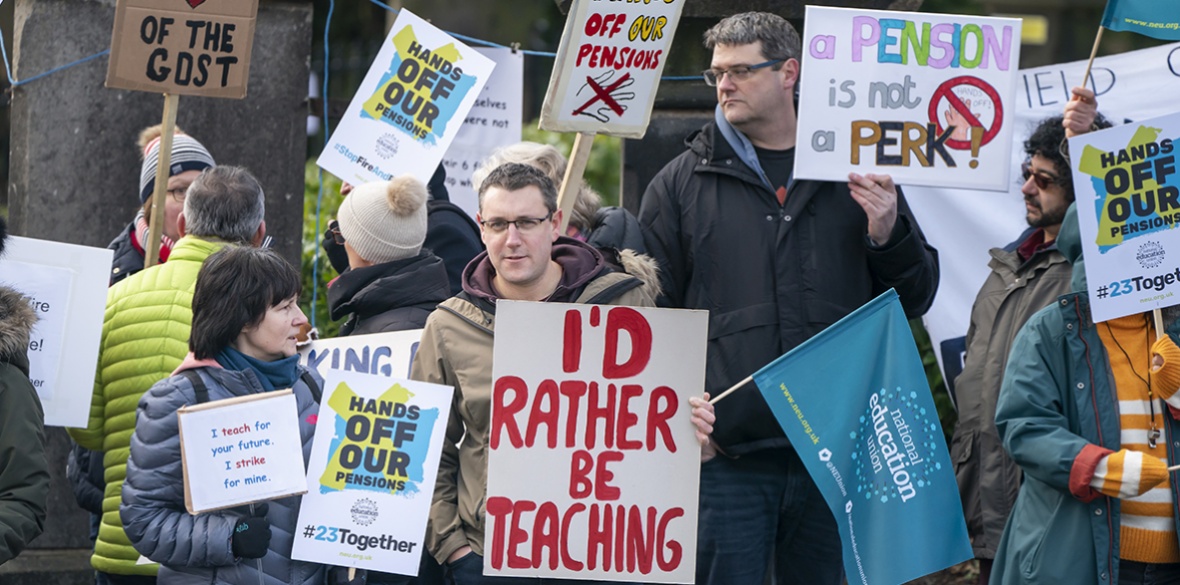This is the last article you can read this month
You can read more article this month
You can read more articles this month
Sorry your limit is up for this month
Reset on:
Please help support the Morning Star by subscribing here
THE last few weeks have shown the complete and utter turmoil this government is in.
As people on the streets of Britain face a cost-of-greed crisis, fuelled by the super-rich making obscene profits by impoverishing the working class, Liz Truss and her cronies stepped in to offer tax breaks and further austerity, crashing the economy in the process.
We are led by a cabal which seems unable even retain the support of those it aims to enrich.
Contrast that with the massive public support shown to the CWU, to RMT and Aslef, to the Felixstowe dockers, and to all those willing to stand up and take on penny-pinching employers and corrupt politicians.
In recent weeks, I have joined many of these workers on the picket lines in solidarity but, as of last week, I am proud that we in the NEU intend to join them.
The NEU has announced three significant preliminary ballot results in the last week.
Support staff members voted 78 per cent in favour of strike action on a 68 per cent turnout. Teacher members voted 86 per cent in favour of strike action on a 62 per cent turnout.
Sixth-form college members voted 97 per cent in favour of strike action on a 77 per cent turnout.
These results show the strength of feeling among educators over pay and, for teachers and support staff in state-funded schools, over education funding.
It also shows their disillusionment with a government, and a system, which has failed our most vulnerable young people at the most important time in their lives.
Today, nearly 50 per cent of children in single-parent families live in poverty. Ninety per cent of those single parents are women. Nearly half of all black children live in poverty. Nearly half of children in a family where a child or parent has a disability live in poverty.
All of that tells a story of injustice.
Those children rely on their schools to educate them and to feed them regardless of what Ofsted chief Amanda Spielman may say. And yet, because the government pay award is unfunded, the inadequate 5 per cent awarded to teachers (a real-terms pay cut of more than 6 per cent) will be taken directly out of school budgets.
School budgets which are stretched to the brink after a decade of cuts, as they try to compensate for the growing poverty around them.
The net result will be less money for education, worse recruitment and retention of teachers and a direct threat to support staff jobs.
At the same time, our supply members, whose agencies underpay them whilst ripping off our schools, cannot even be balloted due to Britain’s anti-union laws.
We will not stand by and let this go unchallenged. We will unite the education profession.
The attacks on pay in education are the direct responsibility of successive conservative-led governments since 2010. But their roots lie in the Thatcher governments of the 1980s.
In 1987, following the end of the 1984-86 teachers’ dispute, the government unilaterally withdrew from collective bargaining arrangements and, since then, teachers have not had the right to sit opposite their employer and negotiate over pay.
This was followed less than a year later by the 1988 Education Reform Act, which began the fragmentation and marketisation of our schools.
Forcing down educators’ pay was combined with increasing control and narrowing of education itself.
They were not attacks that took place in isolation. Privatisation, fragmentation and redistribution from the working class to the rich were the watchwords from Thatcher, through New Labour to the Conservative governments of the last 12 years.
Public services have been decimated, broken up and sold off. Workers in every sector have seen a massive drop in their standard of living and are increasingly subject to the precarity and uncertainty of the market.
The anti-union laws threatened by Truss and co will deepen this crisis, attacking workers rights while restricting their ability to fight back through their unions. This is a challenge we must face together.
As a national officer of the NEU over the past three years, I have spent much of my time on picket lines and at mass meetings, not just of NEU members but of RMT members and Unite members, CWU members and Unison members. I know that we are stronger when we fight together, and win together.
As we prepare to ballot our members in state-funded schools and sixth-form colleges we know this is not just a fight over educators’ pay.
It is a fight over funding for schools and all public services. It is a fight against child poverty. It is a fight to regain collective bargaining rights and to defend the right to strike.
It is a fight in solidarity with those defending our rail service and our postal service. It is a fight to build a strong and militant trade union movement, capable of winning back what has been taken from us over the past 40 years. It is a fight we must wage together and win together.
Daniel Kebede is a national officer and past president of the NEU.










